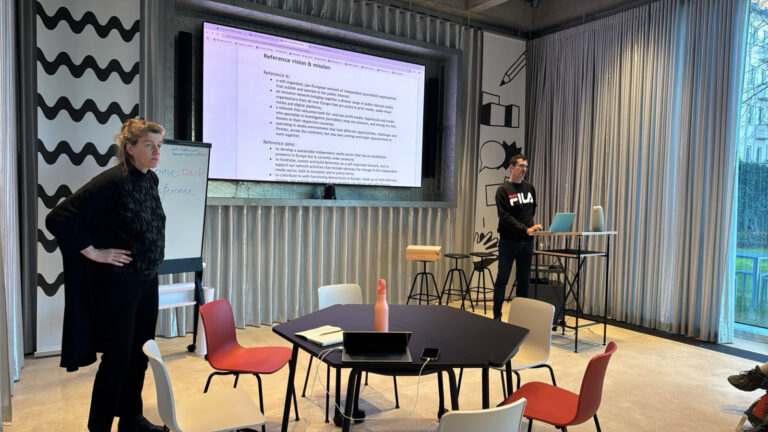Berlin, December 2024 – In late November, members of the Reference network came together in Berlin for two days of lively discussions, reflection and forward planning. The gathering, which took place in the Publix building, also welcomed several Civitates grantees into the sessions, offered a space to take stock of the past year and set the direction for the next phase of Reference’s development.
The joint meeting broadened the perspectives in the room and deepened the exchanges among participants. The addition of the Civitates grantees enriched the discussions with fresh experiences and insights, highlighting the diversity of Europe’s independent public-interest media and the value of learning from one another.
Across the two days, members revisited Reference’s strategy, governance and shared priorities. The conversations reflected a growing sense of maturity within the network, one that is increasingly member-driven, transparent and ambitious about its role in strengthening independent journalism in Europe.
The meeting also marked the election of a new G5, the governing body that helps steer the network’s activities and ensures its decisions are implemented. The new members, drawn from diverse organisations across the continent, will guide Reference through the next stage of its growth as it continues to refine its structure and expand its impact.
Building on earlier meetings in Mechelen and elsewhere, the Berlin sessions helped to “close circles” on many of the governance questions that have shaped Reference over the past two years. Members endorsed the network’s updated strategy, which sets out a clearer vision for how Reference can support collaboration, strengthen solidarity among independent media, and increase visibility for their collective work.
Sharing knowledge, strengthening connections
A central element of the Berlin gathering was the set of knowledge-sharing and peer-learning sessions. These exchanges gave members and Civitates grantees the chance to share practices, reflect on their respective experiences, and explore solutions to common challenges, from sustaining independent media models and ensuring editorial integrity, to fostering collaboration across borders.
The sessions were informal but highly engaging, with participants sharing lessons learned from their own reporting and organisational journeys. The conversations reaffirmed the importance of Reference as a space where peers can connect and learn from one another, and where collective insight translates into stronger journalism and more resilient organisations.
Rozina Breen, CEO and chief editor of the Bureau of Investigative Journalism, mentioned that “These sessions remind us that we’re not working in isolation. The more we share our experiences, the more we realise how much we can achieve together.”
Anchoring our work: mapping public-interest journalism
Another significant item on the agenda was the discussion of the newly published Journalism Value Report: Mapping the State of Public Interest Journalism in Europe, a study involving 174 newsrooms across 31 European countries. The findings emphasise the financial precarity of many smaller, independent outlets and highlight urgent sector-wide needs: core funding rather than only project-based support; capacity-building in business skills and fundraising; and platforms for collaboration and peer learning.
Reference members have used this report as a basis to reflect on their own work, reaffirming the network’s role in helping newsrooms share resources, build resilience and develop sustainable models of public-interest journalism. The report’s insights underlined that collaboration and peer exchange are not optional extras, but vital for the health of the independent media sector in Europe.
Exploring new pathways for funding
One of the most engaging sessions in Berlin focused on the question of how independent media can diversify and strengthen their funding models. The conversation combined both practical experience and theoretical insight, beginning with an introduction to new philanthropic and pooled funding models, including the Media Forward Fund (MFF), which supports journalism serving the public interest in Germany, Austria and Switzerland. The presentation highlighted how such initiatives are helping to create more resilient information ecosystems by encouraging collaboration between foundations, investors and media organisations.
Following this, Reference members shared their own approaches to financial diversification in an open and practical exchange. Participants compared different models for balancing project-based and core funding, discussed the challenges of sustaining long-term support, and explored how networks like Reference can help connect members to new opportunities. The dialogue underlined that while fundraising remains a challenge, peer exchange and shared learning are powerful tools for navigating it.
Ioana Epure, from Press One, noted, “Understanding how others manage to stay independent and sustainable is incredibly valuable, it helps us rethink what’s possible.”
Looking ahead
The Berlin meeting underscored Reference’s collective commitment to collaboration, mutual support and sustainability. With a newly elected G5, a refreshed strategic mandate and plans for stronger member engagement, the network is well positioned to deepen its impact in 2025.
As shared by Peter Matjašič, newly elected working chairman for Reference, “Reference has become the space where independent, cross-border journalism in Europe meets, learns and plans together. The next stage is about growing that community, and making sure it can thrive.The next Reference gathering will take place in 2025, continuing the work of building a stronger, more connected network of Europe’s independent media”.

